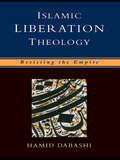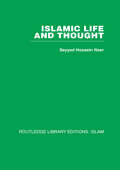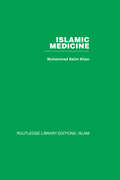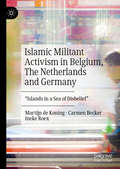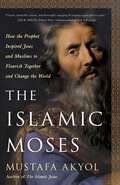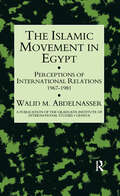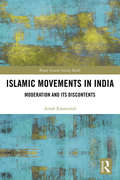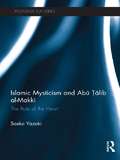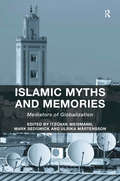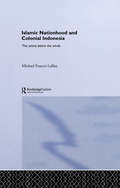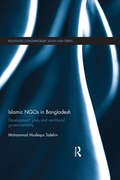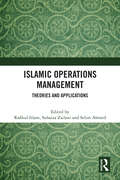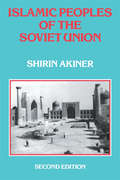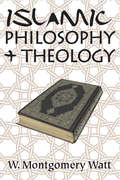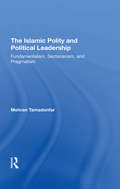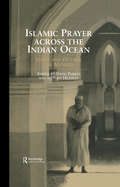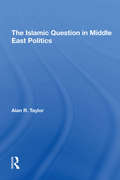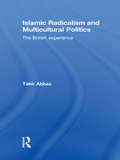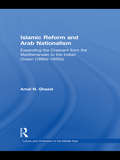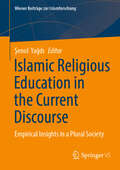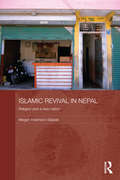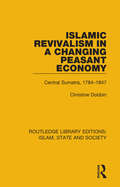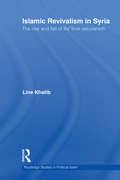- Table View
- List View
Islamic Liberation Theology: Resisting the Empire
by Hamid DabashiThis book is a radical piece of counter-intuitive rethinking of the clash of civilizations theory and global politics. In this richly detailed criticism of contemporary politics, Hamid Dabashi argues that after 9/11 we have not seen a new phase in a long running confrontation between Islam and the West, but that such categories have in fact collapsed and exhausted themselves. The West is no longer a unified actor and Islam is ideologically depleted in its confrontation with colonialism. Rather we are seeing the emergence of the US as a lone superpower, and a confrontation between a form of imperial globalized capital and the rising need for a new Islamic theodicy. The combination of political salience and theoretical force makes Islamic Liberation Theology a cornerstone of a whole new generation of thinking about political Islamism and a compelling read for anyone interested in contemporary Islam, current affairs and US foreign policy. Dabashi drives his well-supported and thoroughly documented points steadily forward in an earnest and highly readable style.
Islamic Life and Thought
by Seyyed Hossein NasrThis collection of essays by one of the best known contemporary Muslim scholars writing in English covers many facets of Islamic life and thought. The author has brought together studies dealing with the practical as well as intellectual aspects of Islam in both their historical and contemporary reality. The contemporary significance of themes such as religion and secularism, the meaning of freedom, and the tradition of Islamic science and philosophy is given particular attention.
Islamic Medicine
by Muhammad Salim KhanOriginally published in 1986, this volume deals with the historical, philosophical and psychological concepts found in Islamic medical practices, and covers Islamic ideas on physiological, pathological, curative and preventative medicine. This was the first systematic study of Islamic medicine to be published in the English language and continues to have much relevance at a time when interest both in Islamic thought and in alternatives to conventional medicine is strong.
Islamic Militant Activism in Belgium, The Netherlands and Germany: "Islands in a Sea of Disbelief"
by Martijn de Koning Carmen Becker Ineke RoexBased on ethnographic research in Belgium, The Netherlands, and Germany, this book presents a novel approach to studying Muslim militant activism. While much existing research focuses on the process of radicalization, these authors introduce a different set of questions that investigate specific modes of activism, and their engagement with dominant discourses and practices in media and state policies. Drawing on social movement theory and Foucault’s work on counter-conduct, this research explores how daʿwa networks came about, and how activists developed themselves in interaction with state and media practices. This perspective highlights a form of activism and resistance in which activists turn against policies and debates centring on Muslims and Islam, while attempting to create and protect an alternative space for themselves in which they can experience Islam according to their own perception of it. The study will contribute to debates about resistance, social movements and militant activism among Muslims in Europe.
The Islamic Moses: How the Prophet Inspired Jews and Muslims to Flourish Together and Change the World
by Mustafa AkyolA theological and historical exploration of the connection between Islam and Judaism through the single most-mentioned character in the Quran: Moses.There is one human mentioned in the Quran more than any other: Moses. Why is it that the Jewish prophet dominates the Islamic scripture? Because he is the role model for Muhammad, Islam’s own prophet. Because Islam, just like Christianity, is deeply intertwined with Judaism — although surprisingly little attention has been given to this fascinating connection between the two religions.Author and journalist Mustafa Akyol takes readers on a theological and historical walk through that much-neglected side of the Abrahamic triangle: the Judeo-Islamic tradition. Using Moses’ presence in the Quran as a jumping-off point, Akyol explores the first historical encounter between Muslims and Jews, the creative symbiosis and mutual enrichment that occurred between the two belief systems in medieval times, and the modern emergence, development, and perception of the two religions.At a time of bitter conflict in the Middle East, The Islamic Moses dives into the older, deeper, and often unexpectedly brighter story of Jews and Muslims. Readers of any background will be surprised by the common historical and theological ground that exists between the two religions, and will come away with a better understanding of both.
Islamic Movement In Egypt
by AbdelnasserFirst published in 1994. Routledge is an imprint of Taylor & Francis, an informa company.
Islamic Movements in India: Moderation and its Discontents (Royal Asiatic Society Books)
by Arndt-Walter EmmerichThis book analyses the emerging trend of Muslim-minority politics in India and illustrates that a fundamental shift has occurred over the last 20 years from an identity-dominated, self-serving and inward-looking approach by Muslim community leaders, Islamic authorities and social activists that seeks to protect Islamic law and culture, towards an inclusive debate centred on socio-economic marginalisation and minority empowerment. The book focuses on Muslim activists, and members and affiliates of the Popular Front of India (PFI), a growing Muslim-minority and youth movement. Drawing on qualitative fieldwork undertaken since 2011, the author analyses recent literature on Muslim citizenship politics and the growing involvement of Islamist organisations and movements in the democratic process and electoral politics to demonstrate that religious groups play a role in politics, development, and policy making, which is often ignored within political theory. The book suggests that further scrutiny is needed of the assumption that Muslim politics and Islamic movements are incompatible with the democratic political framework of the modern nation state in India and elsewhere. Contributing to a more nuanced understanding of how Islamic movements utilise various spiritual, organisational and material resources and strategies for collective action, community development and democratic engagement, the book will be of interest to academics in the field of political Islam, South Asian studies, sociology of religion and development studies.
Islamic Mysticism and Abu Talib Al-Makki: The Role of the Heart (Routledge Sufi Series)
by Saeko YazakiBoth in everyday language and religious metaphor, the heart often embodies the true self and is considered to be the seat of emotion in many cultures. Many Muslim thinkers have attempted to clarify the nature of Sufism using its metaphorical image, particularly in the tenth and eleventh centuries. This book examines the work of Abū Tālib al-Makkī and his wider significance within the Sufi tradition, with a focus on the role of the heart. Analysing his most significant work, Qūt al-qulūb (‘The Nourishment of Hearts’), the author goes beyond an examination of the themes of the book to explore its influence not only in the writing of Sufis, but also of Hanbalī and Jewish scholars. Providing a comprehensive overview of the world of al-Makkī and presenting extracts from his book on religious characteristics of the heart with selected passages in translation for the first time in English, this book will give readers a better understanding not only of the essential features of Sufism, but also the nature of mysticism and its relation to monotheistic faiths.
Islamic Myths and Memories: Mediators of Globalization
by Itzchak WeismannIslamic myths and collective memory are very much alive in today’s localized struggles for identity, and are deployed in the ongoing construction of worldwide cultural networks. This book brings the theoretical perspectives of myth-making and collective memory to the study of Islam and globalization and to the study of the place of the mass media in the contemporary Islamic resurgence. It explores the annulment of spatial and temporal distance by globalization and by the communications revolution underlying it, and how this has affected the cherished myths and memories of the Muslim community. It shows how contemporary Islamic thinkers and movements respond to the challenges of globalization by preserving, reviving, reshaping, or transforming myths and memories.
Islamic Nationhood and Colonial Indonesia: The Umma Below the Winds (SOAS/Routledge Studies on the Middle East)
by Michael Francis LaffanDrawing on previously unavailable archival material, this book argues that Indonesian nationalism rested on Islamic ecumenism heightened by colonial rule and the pilgrimage. The award winning author Laffan contrasts the latter experience with life in Cairo, where some Southeast Asians were drawn to both reformism and nationalism. After demonstrating the close linkage between Cairene ideology and Indonesian nationalism, Laffan shows how developments in the Middle East continued to play a role in shaping Islamic politics in colonial Indonesia.
Islamic NGOs in Bangladesh: Development, Piety and Neoliberal governmentality (Routledge Contemporary South Asia Series)
by Mohammad Musfequs SalehinNGOs (Non-Governmental Organizations) have emerged in both a development and aid capacity in Bangladesh, providing wide-reaching public services to the country’s population living in extreme poverty. However, resistance to and limitations of NGO-led development - which in conjunction with Bangladesh’s social transformation - led to a new religious-based NGO development practice. Looking at the role of Islamic NGOs in Bangladesh, the book investigates new forms of neoliberal governmentality supported by international donors. It discusses how this form of social regulation produces and reproduces subjectivities, particularly Muslim women subjectivity, and has combined religious and economic rationality, further complicating the boundaries and the relationship between Islam, modernity, and development. The book argues that both secular and Islamic NGOs target women in the name of empowerment but more importantly as the most reliable partners to meet their debt obligations of micro-financing schemes, including shari’a-based financing. The targeted women, in turn, experience Islamic NGOs as less coercive and more sensitive to their religious environment in the rural village community than are secular NGOs. Providing a comparative study of the role of religious and secular NGOs in the implementation of neoliberal policies and development strategies, this book will be a significant addition to research on South Asian Politics, Development Studies, Gender Studies, and Religion.
Islamic NGOs in Bangladesh: Development, Piety and Neoliberal governmentality (Routledge Contemporary South Asia Series)
by Mohammad Musfequs SalehinNGOs (Non-Governmental Organizations) have emerged in both a development and aid capacity in Bangladesh, providing wide-reaching public services to the country’s population living in extreme poverty. However, resistance to and limitations of NGO-led development - which in conjunction with Bangladesh’s social transformation - led to a new religious-based NGO development practice. Looking at the role of Islamic NGOs in Bangladesh, the book investigates new forms of neoliberal governmentality supported by international donors. It discusses how this form of social regulation produces and reproduces subjectivities, particularly Muslim women subjectivity, and has combined religious and economic rationality, further complicating the boundaries and the relationship between Islam, modernity, and development. The book argues that both secular and Islamic NGOs target women in the name of empowerment but more importantly as the most reliable partners to meet their debt obligations of micro-financing schemes, including shari’a-based financing. The targeted women, in turn, experience Islamic NGOs as less coercive and more sensitive to their religious environment in the rural village community than are secular NGOs. Providing a comparative study of the role of religious and secular NGOs in the implementation of neoliberal policies and development strategies, this book will be a significant addition to research on South Asian Politics, Development Studies, Gender Studies, and Religion.
Islamic Operations Management: Theories and Applications
by Rafikul Islam Suhaiza Zailani Selim AhmedManaging operations is an integral part of all business and comprises a number of components, including quality management, production planning, supply chain management, logistics, and inventory control. The effective management of operations plays a defining role in enhancing business efficiency and is a lynchpin for success.This book explores how Islamic principles and tools can be applied to improve operations management across industries. While Islamic banking and finance are established disciplines, there is yet little evidence of how exploring operations management from an Islamic lens can improve efficiency. Bringing together leading scholars across subdisciplines, the Editors fill the long-standing gap and address the rising demand for halal products and services by providing a unique perspective to define and enhance an important, growing field.This book will be a useful reference for those who wish to understand all aspects of Islamic business operations and halal logistics. The book will be helpful to academics, researchers, and upper level students, in particular to those who are looking to further their research on how Islamic principles can be applied to business operations.
Islamic Peoples Of The Soviet Un
by AkinerFirst published in 1987. Routledge is an imprint of Taylor & Francis, an informa company.
Islamic Philosophy and Theology: An Extended Survey (The\new Edinburgh Islamic Surveys Ser.)
by W. Montgomery WattEvents are making clear to ever-widening circles of readers the need for something more than a superficial knowledge of non-European cultures. In particular, the blossoming into independence of numerous African states, many of which are largely Muslim or have a Muslim head of state, has made clear the growing political importance of the Islamic world, and, as a result, the desirability of extending and deepening the understanding and appreciation of this great segment of mankind. Islamic philosophy and theology are looked at together in a chronological framework in this volume. From a modern standpoint, this juxtaposition of the two disciplines is important for the understanding of both; but it should be realized at the outset that it is a reversal of the traditional Islamic procedure. Not merely were the disciplines different, but in the earlier centuries the exponents were two different sets of persons, trained in two different educational traditions, each with its own separate institutions. There was little personal contact between philosophers and theologians, and the influence of the two disciplines on one another was largely by way of polemics. Eventually while philosophy died out as a separate discipline in the Islamic world, many parts of it were incorporated in theology. This work is designed to give the educated reader something more than can be found in the usual popular books. The work undertakes to survey a special part of the field, and to show the present stage of scholarship. Where there is a clear picture this will be given; but where there are gaps, obscurities and differences of opinion, these will also be indicated. This work is brilliant in its design, style, and intimate understanding. It is a must read for specialists and policy makers alike.
Islamic Politics, Muslim States, and Counterterrorism Tensions
by Peter HenneThe US Global War on Terror and earlier US counterterrorism efforts prompted a variety of responses from Muslim states despite widespread Islamic opposition. Some cooperated extensively, some balked at US policy priorities, and others vacillated between these extremes. This book explains how differing religion-state relationships, regimes' political calculations, and Islamic politics combined to produce patterns of tensions and cooperation between the United States and Muslim states over counterterrorism, using rigorous quantitative analysis and case studies of Pakistan, the United Arab Emirates, and Turkey. The book combines recent advances in the study of political institutions with work on religion and politics to advance a novel theory of religion and international relations that will be of value to anyone studying religion, terrorism, or Islamic politics. It also provides numerous insights into current events in the Middle East by extending its analysis to the Arab Spring and the rise of the Islamic State.
The Islamic Polity And Political Leadership: Fundamentalism, Sectarianism, And Pragmatism
by Mehran TamadonfarThis book is employed for the study of the Islamic polity and political leadership and examines the basic features of the Islamic polity. It provides a theoretical framework for the study of political authority in the Islamic world signifying individual leaders' characteristics.
Islamic Prayer Across the Indian Ocean: Inside and Outside the Mosque (Routledge Indian Ocean Series)
by Stephen Headley David ParkinIn its attempt to squash the influence of animism and pantheism or polytheism and to promote the idea of the One and Only Absolute God, Islam has come up against a tendency within itself to incorporate certain local religious traditions and practices. This book shares that combination of universality and local particularity, exploring this paradox and the contradictory tendencies contained in it.
The Islamic Question In Middle East Politics
by Alan R TaylorThis book provides an overview of the origins, development, and eventual encounters of secular nationalism and the various manifestations of the Islamic reform movement. The scope of the book is restricted to the Middle East (Turkey, Iran, and the Arab states).
Islamic Radicalism and Multicultural Politics: The British Experience
by Tahir AbbasThe expression of an Islamic political radicalism in Britain has been one of the most dramatic developments in recent decades. Islamic Radicalism and Multicultural Politics explores the nature of this phenomenon by analysing the origins of Islam and its historical contact with Western Europe and Britain, and the emergence of Islamic political radicalism in the Muslim world and in the West. Tahir Abbas draws on historical analysis and contemporary case studies to explore the post-war immigration and integration of Muslim groups, the complex relations that exist between a secular liberal Britain and a diverse but multifaceted Islam, and the extent of social and economic inequalities that affect Muslims as individual citizens and in local area communities. He shows how violent extremism among British Muslims is in reality influenced by a range of issues, including the factors of globalisation and contemporary politics, media and culture. Analysing and dissecting public policy, Abbas offers suggestions for tackling the major social, political and economic questions facing British Muslims in the post-7/7 era. An important contribution to the study of religion, ‘race’ and ethnicity in modern Britain, this accessible work will be of interest to anyone working in the field of Islamic studies, sociology and political radicalism. Cover design by Mahtab Hussain, www.mahtabhussain.com
Islamic Reform and Arab Nationalism: Expanding the Crescent from the Mediterranean to the Indian Ocean (1880s-1930s) (Culture and Civilization in the Middle East)
by Amal N. GhazalBridging African and Arab histories, this book examines the relationship between Islam, nationalism and the evolution of identity politics from late 19th Century to World War II. It provides a cross-national, cross-regional analysis of religious reform, nationalism, anti-colonialism from Zanzibar to Oman, North Africa and the Middle East. This book widens the scope of modern Arab history by integrating Omani rule in Zanzibar in the historiography of Arab nationalism and Islamic reform. It examines the intellectual and political ties and networks between Zanzibar, Oman, Algeria, Egypt, Istanbul and the Levant and the ways those links shaped the politics of identity of the Omani elite in Zanzibar. Out of these connections emerges an Omani intelligentsia strongly tied to the Arab cultural nahda and to movements of Islamic reform, pan-Islamism and pan-Arabism. The book examines Zanzibari nationalism, as formulated by the Omani intelligentsia, through the prism of these pan-Islamic connections and in the light of Omani responses to British policies in Zanzibar. The author sheds light on Ibadism - an overlooked sect of Islam - and its modern intellectual history and the role of the Omani elite in bridging Ibadism with pan-Islamism and pan-Arabism. Although much has been written about nationalism in the Arab world, this is the first book to discuss nationalism in Zanzibar in the wider context of religious reform and nationalism in the Arab world, and the first to offer a new framework of analysis to the study of pan-Islamic and pan-Arab movements and nationalism.
Islamic Religious Education in the Current Discourse: Empirical Insights in a Plural Society (Wiener Beiträge zur Islamforschung)
by Şenol YağdıThe volume presents the most current empirical research in the field of Islamic religious education. Its findings are an important contribution to the development of theory in Islamic religious education. The contributions address the challenges of Islamic religious education and professionalization research of Islamic religious education teachers and in a plural society.
Islamic Revival in Nepal: Religion and a New Nation (Routledge Contemporary South Asia Series)
by Megan Adamson SijapatiThis book draws on extensive fieldwork among Muslims in Nepal to examine the local and global factors that shape contemporary Muslim identity and the emerging Islamic revival movement based in the Kathmandu valley. Nepal's Muslims are active participants in the larger global movement of Sunni revival as well as in Nepal's own local politics of representation. The book traces how these two worlds are lived and brought together in the context of Nepal's transition to secularism, and explores Muslim struggles for self-definition and belonging against a backdrop of historical marginalization and an unprecedented episode of anti-Muslim violence in 2004. Through the voices and experiences of Muslims themselves, the book examines Nepal’s most influential Islamic organizations for what they reveal about contemporary movements of revival among religious minorities on the margins--both geographic and social--of the so-called Islamic world. It reveals that Islamic revival is both a complex response to the challenges faced by modern minority communities in this historically Hindu kingdom and a movement to cultivate new modes of thought and piety among Nepal’s Muslims.
Islamic Revivalism in a Changing Peasant Economy: Central Sumatra, 1784-1847 (Routledge Library Editions: Islam, State and Society)
by Christine DobbinThis title, first published in 1983, is a significant study of one of the many revivalist movements which flowered in numerous Islamic societies in the late eighteenth and early nineteenth centuries, and attempts to provide one particular assessment of the place of revivalism in the evolution of Islamic societies. The subject of this title is the Padri movement, and the community involved is that of the Minangkabau of Central Sumatra, one of the major communities inhabiting the Indonesian archipelago. In the process of considering the reconstruction of a society in the throes of an agricultural transformation, the historical development of the Indonesian village became the object of attention, encompassing the economic and social histories of individual villages. This title will be of interest to students of history and Islamic Studies.
Islamic Revivalism in Syria: The Rise and Fall of Ba'thist Secularism (Routledge Studies in Political Islam)
by Line KhatibContemporary studies on Syria assume that the country’s Ba’thist regime has been effective in subduing its Islamic opposition, placing Syria at odds with the Middle East’s larger trends of rising Islamic activism and the eclipse of secular ideologies as the primary source of political activism. Yet this assumption founders when confronted with the clear resurgence in Islamic militantism in the country since 2004. This book examines Syria’s current political reality as regards its Islamic movement, describing the country’s present day Islamic groups – particularly their social profile and ideology – and offering an explanation of their resurgence. The analysis focuses on: Who are today’s Syrian Islamic groups? Why and how are they re-emerging after 22 years of relative silence as an important socio-economic and political force? How is the Syrian state dealing with their re-emergence in light of Syria’s secularism and ideologically diverse society? Bridging area studies, Islamic studies, and political science, this book will be an important reference for those working within the fields of Comparative Politics, Political Economy, and Middle Eastern Studies.
